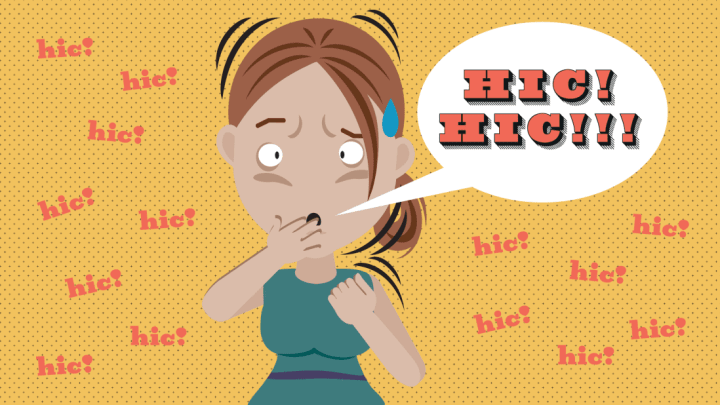Hiccup is a perfect specimen of onomatopoeia, a word that sounds like the noise it represents: It echoes that sudden breath (hick-) and spasm (-up) of the diaphragm when, say, we’ve gobbled down food too quickly. But English is far from unique here. If we listen across the globe, we’ll hear all sorts of gasping Hs and gulping Ks, so much so that it almost seems like there’s a universal word for hiccup. Except there are some surprising, er, hiccups along the way. Get that spoonful of sugar, salt, or peanut butter ready—here are 35 hiccup words in other languages.
1., 2., 3., 4., and 5. Danish, Norwegian, Swedish, Icelandic, and Finnish
The English word hiccup (later spelled hiccough) is first recorded in 1580, according to the Oxford English Dictionary. A few decades earlier, English was using the word hicket. This word is a near mirror of the word in Scandinavian languages. Danish and Norwegian have hikke. The Swedish hicka is essentially the same. Up in Iceland, it’s hicksti. And over in Finland—neighbor in geography, though not tongue—it’s hikka.
6. French
If the French have had too much wine, they might hoquet. The -et, a diminutive ending found in English words like gullet, likely influenced the earlier English hicket.
7. Spanish
In Spain, you get a bad case of the hipos.
8. and 9. Portuguese and Latin
You’d expect Spanish’s neighbor and Romance-language cousin, Portuguese, to have a nearly identical way of hiccuping, right? Think again. In Portugal, a hiccup is called a soluço, which may sound more like a sneeze to some ears. Soluço appears to derive from a Latin word for the bodily function: singultus, whose G brings back the hiccup’s characteristic gulp.
10. and 11. Italian and Romanian
Latin’s singultus also coughs up hiccup in Italian, singhiozzo—proving, yet again, that everything is more fun to say in Italian. Nearby in Romania, it’s sughiț, with that final ț pronounced like the ts in fits.
12. and 13. Welsh and Irish
The Welsh have ig and the Irish snag, which happens to look like that metaphorical hiccup in English, or a “minor difficulty or setback.”
14. and 15. Dutch and German
Dutch has the straightforward sound of hik, but German has to be different with schluckauf, literally a “swallow up.” German, though, also has the onomatopoeic Hecker (noun) and hicksen (verb) for these belly bumps.
16., 17., 18., 19., and 20. Russian, Ukrainian, Polish, Czech, and Bulgarian
Like the Scandinavian languages, Slavic hiccuping sounds like hiccuping, just more Slavic-y. Russia gets an attack of the ikotas (икота), Ukraine the hykavkas (гикавка), Polish the czkawkas, Czech the škytavkas, and Bulgarian the khulstanes (хълцане), to let out a few examples from this language family.
21. Albanian
Hiccuping in Albanian, which boasts its own branch in the Indo-European languages, is a bit softer, but it does still feature something of a hiccupy bounce: lemzë (pronounced like lemzuh).
22. Greek
The diaphragm reflex in Greece can take the form of λόξιγκας, which roughly transliterates to loxigkas.
23. Arabic
You try to get rid of your حازوقة (hazuqa) or فُواق (fuwaq) in Arabic ...
24. Turkisn
… or hıçkırık (which sounds like hichkerek) in Turkish ...
25. SWAHILI
… or kwikwi around parts of southeastern Africa.
26. Yoruba
To say you have the hiccups in Yoruba, spoken widely in Western Africa, use òsúkèsúkèsúkè.
27. Zulu
In South Africa, where the Zulu language is prominent, you might call a hiccup an ingwici—with the letter c representing a click sound.
28. Chinese
The Mandarin word for hiccup gets right to the back of the throat: 嗝, gé, voiced with a rising tone. The left part of the character, which looks like a squished box, is 口 (kǒu), meaning “mouth.”
29. Japanese
Like English, the Japanese for hiccup features a hard k-sound smack dab in the middle of the word: shakkuri (or しゃっくり in kana).
30. Korean
The Korean for hiccup is a three-part affair: 딸꾹질, roughly tal-kuk-jil.
31. Vietnamese
Slurp down your pho too fast? The basic word for hiccup in Vietnamese is nấc.
32. and 33. Hindi and Bengali
Hundreds of millions of speakers of Hindi in India say हिचकी (hichakee, pronounced a bit like hitch-key). The word is similar in other closely related Indian languages in the region, such as Bengali হিক্কা(hikka).
34. Bahasa Indonesian
You might say “Excuse me” throughout Indonesia for your kecegukan, the word for hiccup in Bahasa Indonesian, the Malay-based official language and lingua franca of Indonesia.
35. Old English
A word Old English had for hiccup is ælfsogoða, literally a kind of “elves’ heartburn.” Apparently, Anglo-Saxons believed hiccups were caused by, yep, elves. It turns out that it isn’t just cures for the hiccups that are old wives’ tales.
BONUS: KLINGON
The fictional language of Star Trek’s Klingon is notoriously guttural. Most of the words we’ve seen for hiccup across the globe indeed feature such back-of-the-throat Gs and Ks—yet the Klingon word for hiccup is bur. Let’s chalk that up to biological differences: Klingons are extraterrestrial beings, after all.
This article was originally published in 2017; it has been updated for 2022.
